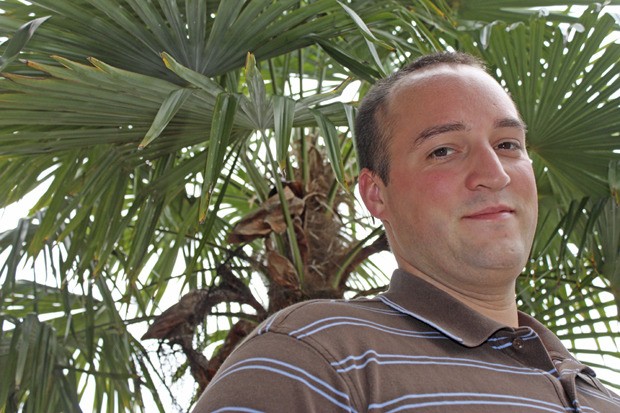Defanging bombs in a hostile land is a risky business.
A job that calls for quick thinking, cold precision and a steady hand even as bullets kick up dirt and bits of street around you. Military bomb technicians must decide the best way to defuse the devices when one wrong move can kill them.
Auburn’s Scot Pondelick faced those life-and-death situations almost daily as a member of a strategic U.S. Army bomb squad – the 731st EOD (Explosive Ordnance Disposal) Company – in three separate, long tours of duty in Iraq.
Was it constant fear?
“You get over it really quickly. You get used to it. You kind of become indifferent,” said Pondelick, who spent 8½ years in the Army, three of them overseas handling explosives, before leaving the service last year with the rank of sergeant. “It’s one of those things where if it (a mortar or bomb) hits you, there’s nothing you can do. If it misses you, you’re lucky.”
A typical mission for Pondelick’s team? Identifying and defusing deadly improvised explosive devices (IEDs) from city streets, airstrips and from the countryside.
At the height of Pondelick’s work, mostly in and around Baghdad on his second tour of duty, his three-member team was responding to some 15 incidents daily, defusing, assessing or investigating bombs and the devastation coiled up inside of them. Weapons might come in any form: chemical, biological, radiological, nuclear or conventional.
War games
It was a never-ending chess match, finding bombs set there by a cunning enemy.
“I tried to think outside the box,” Pondelick said. “My job was 100-percent dedicated to thinking outside the box, because if you went the same way every single time, you would die.
“For example, if you had an IED in the same place, every day, same time, days on end, and if you did the exact same thing (to approach them), you (would) die,” Pondelick said. “You had to do things differently. You had to come up with all these different ways of doing things, or even better.”
On his first deployment, 21-year-old Pondelick had a close call. A mortar landed about 100 feet away while he was standing guard on a Taji airfield, north of Baghdad.
To protect itself against frequent shelling from insurgents, the company reinforced its trailer/living quarters with high sandbag walls.
Yes, Pondelick says, he was extremely fortunate. In three deployments, he and his team escaped serious injuries. But many of his friends lost arms, legs – even their lives.
“I look at it like I was very lucky. That’s one of the reasons why I got out,” he said. “I considered myself extremely lucky for three tours.”
Pondelick won’t soon forget those images and stories. War takes its pound of body and soul. The long tours, one that lasted 15 months, tested and finally ended his marriage.
He has trouble sleeping. His body “creaks like an old man.”
While he is proud of the work he and his soldiers did in Iraq, he is skeptical about Iraq’s future. The country is still divided, he observed, ripped by civil war in a volatile, violent region.
“Theoretically, we went over there for good purposes,” Pondelick said. “We were going to go over there to liberate the country, take out Saddam (Hussein). When we first got over there and everything happened, everybody loved us. The longer we stayed, the more people didn’t like us. A lot of them still realize the fact that we went in there to help them out and help them rebuild the country. But it surely seemed like everything we were doing just kind of fell apart underneath us.”
After serving, Pondelick decided to come home, reconnect with family and friends and take up his college studies where he left off. He is a quarter away from completing his associate degree at Green River Community College, and he plans to transfer and continue his path in general studies at the University of Washington Tacoma.
Mayoral bid on his mind
Pondelick, a jack-of-all-trades, wants to continue serving. A frequent spectator at City Council meetings, Pondelick plan to run for mayor next year. Energetic and diligent, Pondelick says he will bring something new and refreshing to City Hall. He is 28.
“I’m able to connect things,” he said. “I like to be involved with what’s going on. I like to have at least some sort of say as to what’s going on.”
He also wants to serve and support fellow veterans. A member of VFW Post 1741, Pondelick is working to help raise revenue for veteran programs. Many veterans, he says, receive inadequate care. Many don’t know where to look for help.
“I owe it to them,” he said. “We need to help our veterans.”
=====
COURTESY PHOTO BELOW: The Army’s Scot Pondelick spent three tours of duty in Iraq, identifying, assessing and defusing bombs, including improvised explosive devices.


